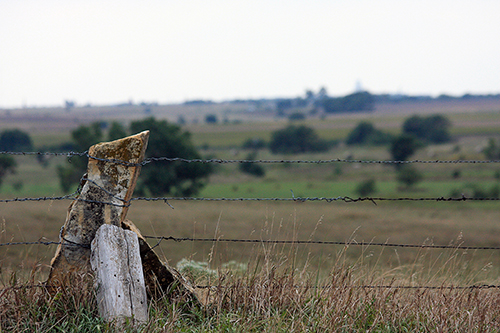The Finer Points of Plowing
By DAVE BERRY
There's something calming about plowing.
Maybe it's the repetition, the ever-shrinking patterns carved in the ground, the throaty roar of the tractor engine at full throttle, the warm breeze in your hair... or maybe it was the overdose of Vitamin D received from too many hours under a hot Kansas sun.
It had been awhile since I thought about those sweat-stained days on the tractor. They surfaced one recent weekend as I piloted my lawn tractor around the tiny square of my front yard, taming the stickerweed lawn, bouncing over molehills, mowing through fire ant beds... all the while plotting their demise.

Only when I pushed aside the urgent, stopped making mental task lists and blocked Monday's schedule from intruding on my weekend did those old memories surface... carried in the just-created column of dust, present in the spent-gasoline smell of exhaust, borne on the breeze that dried the perspiration at my neck.
I knew two tractors - Dad's precious Massey-Harris 44 and my Uncle Ray's older International Harvester W-40.
The old W-40 was a workhorse. Old when I was young, red paint weathered, prone to vapor-locking, it was as stable as a ship on a calm sea. In low gear, it could pull about anything.
Ray was Dad's uncle, my grandmother's brother. He was born on this land - a quarter section homesteaded by his father. Half was cultivated, planted in wheat, milo and alfalfa. The other half was native prairie pitted with buffalo wallows and dotted by groves of sunflowers.
Ray had a great smile, a genuine laugh and a sparkle in his eye. He loved a good story, collected and displayed barbed wire, worked in leather and made belts and wallets out of snakeskin. His tractor shed bore a hand-painted, warning, "Beware Rattlesnakes," painted in bright red, more to ward off thieves than to warn visitors.
Ray gave me my first job. He paid a quarter an hour, but I treasured my time with him and would have worked without pay if he needed me. Our day began as the sun peeked over the low hills to the east. Harvest was over, and the W-40 sat waiting at the edge of the wheat stubble.
Six five-gallon cans filled the gas tank. After lubricating all grease fittings, we topped off the oil, shook dust out of the air filter, pulled chaff from the radiator, brushed some oil onto the plow blades, wrapped a wet rag around the fuel pump and pulled the tin can off the exhaust pipe.
Ray cranked the engine by hand while I nursed the throttle. Once the sputtering engine smoothed out, he climbed on and made the first couple of rounds of the field's perimeter. Then, leaving a metal water jug atop a limestone fencepost, he waved and left me to my plowing until lunch.
My Dad's Massey-Harris 44 was light and nimble. He kept it tuned up and out of the weather most of the year in a tractor shed fashioned from the old cinder block chicken house. For a small tractor, it was powerful, handling most implements well and bogging down only slightly in that patch of gumbo clay.
Dad taught me to drive on that tractor. First, I rode standing at his knee, feet apart for balance, knees bent to absorb the shock, braced against the right fender, death grip on front and rear spotlight brackets. Dad's arm, clamped behind me on the fender, was my only seatbelt. All three of us boys learned to drive that way, riding until we were old enough to take our turn in the seat.
Like NASCAR, plowing goes counterclockwise... left turn, left turn, left turn, left turn. Start at the outside and work to the middle. A three-bottom plow cuts into the ground and turns three rows of dirt over to the right, burying stubble below a layer of dirt and leaving a shallow furrow on the left. Keep your right front tire in the furrow and your rows will be straight.
The tractor had power steering, and Dad taught you to steer with one hand, never two. You gripped a knob mounted on the wheel and spun it to the left to turn, then whipped it back just as quickly to straighten out. I tried using both one time and almost broke my left hand. Lesson learned.
Plowing in the heat of the day was a hot, dusty, monotonous affair. Sometimes the only thing keeping sunburns at bay was a cowboy hat, long sleeves and the thick layer of dust covering you from head to foot.
But late in the evening, when the tractor's spotlights lit the dust cloud that followed you through the dark, when breezes turned cool, stars filled the sky and night insects buzzed through the beams and around the exhaust... the world shrank away.
All you knew, all you cared about, for a time at least, was encapsulated within that small lighted cone of dust. There was time to think, time to imagine, time to fantasize, time to dream. No rush, no pressure, no demands - just make your corners tight, keep your right front tire tight against the wall of the furrow.
Around and around, left turn, left turn, repeating the pattern, rolling the stubble under... until you reached the center of the field.
Did I mention I also learned to fly on the Massey-Harris 44? But that's a story for another day.
Dave Berry is the retired editor of the Tyler Morning Telegraph. This Focal Point column was published April 30, 2014.
Photo: The Kansas plains are studded with limestone fence posts, like this one on the Berry farm. (Photo by Dave Berry)
